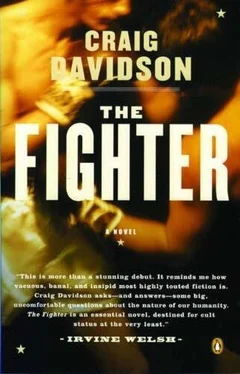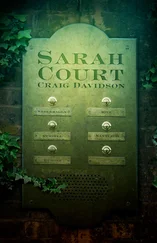Callie’s pussy sopping, wet satin molded to her labia, and Paul hiked her skirt up, hands and teeth shredding her panties and Callie’s box neatly shaved, clitoris poking from its hood hard as a polished pebble and she gripped his cock but when she tried to contort her body to fit it into her mouth, panting ravenously, he pushed her down and rubbed his cock over her pussy, which was tight and hot and wet and when a flicker of dismay crossed his face she ignored it completely, impatient now, grasping his cock and digging her nails into his shaft — he went “Aaaah!”; she went “Come on, move it …” — she slipped him in and then Paul was pushing hard and fast, gasping and dizzy as tree pruners and Garden Weasels shook off their hooks, the two of them rocking together and Paul’s fingers puncturing bags of peat —
And there, under the tepid glow of a sixty-watt bulb with soil crumbling in his bruised hands, Paul Harris saw a sleepy hillside village. Clapboard houses, horses and mules yoked to hitching posts. He stands alone in the street, warm breeze scrolling dust and dry leaves across the lane. With the toe of his boot he drags a line in the dirt. Men come from the saltbox shacks rolling shirt-sleeves to their elbows, swiveling their arms and cracking their necks.
The first man is huge but slow: Paul ducks his ponderous fists, answering with stinging rights and lefts to his boxlike face, splitting it open until the man goes down and is dragged away. The next guy fights fiercely, crushing blows to
Paul’s liver and pancreas until Paul catches him a sneaky right on the temple and he goes down twitching. He fights another, then another and another and another; log-boom stacks pile up in the gullies. They fight in a ring of blood and Paul breaks noses and crushes eyeballs from sockets. Hot blood coats his hands the way nacre forms around a speck of grit and soon his fists are the size of bowling balls, hard and heavy, yet he swings them with ease, crushing ribcages and cracking skulls, pulverizing spinal cords and splattering faces like rotted fruit, the men reduced to sticky pulp, to horrible wet noise, but they keep coming, dozen upon dozen, and Paul dispatches them all without mercy, reducing their bodies to chunks, to gristle and bone, sunk knee-deep in gore and he’s screaming for more, Bring it on, Bring it on, Bring.. It… On.
The Upper New York Golden Gloves qualifying tournament was held in the basement of St. Michael’s cathedral at the corner of Niagara and 12th. The day was December 31, 2005.
The dressing room boiled with voices and bodies, bodies of men and boys, naked chests and shoulders, black, white, brown, beige, yellow. Altar boy smocks and votive candle holders were hung on hooks beside the weigh station.
Rob stripped to his underwear and took his place in line. Irish guys with freckled arms, Mexican flyweights who looked made of braided rope, black cruiserweights with superhero bodies — muscles where there shouldn’t be muscles — Cuban street kids with scars marking their faces, Italian bruisers with marbled forearms and squashed noses. They’d come from all over the region: Lockport and Erie, Lackawanna and Tonawanda, a few driving north from New York City looking for softer brackets. They eyed one another cagily, sizing each other up, laying their own private odds.
Rob stepped onto a scale. His torso shone blue in places, the shaped muscles touched with shadow. An official scribbled “164” on the cover of his boxing book. A fight doc shone a penlight in his eyes and listened to the thack-thack of his heart.
Rob’s US Boxing book was tossed upon the heap at the matchmakers’ table. Three officials were tasked with matching fighters according to weight and experience. As they sorted through books, the trainers assembled on the sidelines voiced their opinion:
“Make it fair, boys, make it fair…”
“Aw, no, man! That boy’s dead for a ringer — no waaaay we taking that match!”
“We’ll fight anybody. AnyBODY!”
Rob was matched against a twenty-five-year-old amateur from Bed-Stuy: Marty “Sugar” Caine. Caine had recently qualified for a berth on the Olympic squad.
Reuben and Rob sequestered themselves in the temporary trainer’s quarters: a rubdown table bookended by flimsy hospital screens. On either side could be glimpsed the shadows of trainers wrapping their fighters’ hands, massaging necks and shoulders.
“Won’t be a cakewalk,” Reuben said. “Caine’s got skills. But his knockout ratio’s piss-poor. You gotta get inside his head, Robbie. I want him thinking, This kid’s got bricks in his chin. I want him thinking, This kid drinks kerosene and breathes nitrous oxide flames. Got it?”
Tommy poked his head through the hospital screen.
“Where’ve you been?” Reuben said.
“Bus broke down on the side of the highway.” He smiled at Rob. “How you feeling, champ?”
A boxing official stopped by to watch Reuben tape Robbie’s hands; New York boxing commission rules stipulated that an official must observe the pre-fight hand wrap to ensure it was done by the book, no lead slugs or mustard-seed oil. The official initialed Rob’s wraps and Reuben had his son lie down on the training table, working winter-green liniment into the muscles of Rob’s back.
“How you feeling?”
“Nervous,” said Rob.
“Hey, if you don’t have butterflies, there’s something the matter with you. Just remember: cowards and heroes feel the same fear. Heroes react to it differently, is all.”
But his father didn’t understand. Rob wasn’t scared of being hit or even getting knocked out. Rob was scared for Marty “Sugar” Caine.
“Fear has been around for centuries,” Reuben said. “It’s old, and it’s good.”

The basement of St. Michael’s cathedral was cloaked in shadow save for a halo of spotlights above the ring. Rows of folding chairs hosted mothers and fathers, local fight enthusiasts, boxers and coaches, the odd talent scout. The canteen was staffed by the nuns of St. Francis. Fighters skipped rope or shadowboxed in darkened corners. A folding table behind them supported a glittering cargo of trophies, each crowned with a brass boxer with arms upraised.
Rob sat between his uncle and father in a black robe. In the ring a pair of middleweights went at it. That they were the same weight seemed insupportable: one a thick-necked fireplug, the other a lanky beanpole. The fireplug pursued the beanpole, hoping to blow a hole through his willowy opponent with one solid punch. The taller fighter kept him at bay, snapping hard jabs, avoiding those bullish charges as smoothly as a toreador.
When the bell rang, the judges scored unanimously in favor of the beanpole. The decision received scattered boos, most of them coming from the fireplug’s cheering section. The beanpole’s supporters jeered back and before long two women — the boxers’ mothers, in all probability — were screaming hysterical threats at each other. “Hold me back!” the fireplug’s mother cried, “or else I’ll pound her!” She took her husband’s arm, braced it across her chest, and again cried, “Hold me back, so help me god! ” Once things settled down, Reuben said, “We’re up.”
Marty “Sugar” Caine was lean and tapered, his every muscle visible under a thin stretching of flesh. Rob noticed a pair of star-shaped welts on Caine’s torso, one between the second and third rib, another above his right nipple.
Gunshot wounds. When Caine turned around in his corner, kneeling to bless himself, Rob saw the exit wounds on his back: scar tissue like lumps of bubblegum smoothed across the underside of a table.
Читать дальше













